U.N. Votes for Spotlight on Afro-Descendants
School Rips Out Yearbook Pages on ’20 News Events
Black Reporter Was Right in Rejecting WWII Spin
Cleveland Residents Train to Cover Meetings
Blacks, Latinos Not Set on One Term for Identity
Satisfaction With Asian Americans’ Treatment Dips
Passings: James French, Jim Stricklin
Rough Road for Afghans Who Helped U.S. Media
Drive Starts to Honor Historic Black Paper
2 Public Stations Disclose Diversity Figures
Short Takes: Association for Education in Journalism and Mass Communication (AEJMC); protecting journalists at protests; Gannett Co. and crime reporting; stonewalling over anti-pipeline policing; Michael Paul Williams; Chicago Reporter; Urban One’s planned casino; Jose Andino; Hollywood Foreign Press Association; Bloomberg Media and Ebony; Eric Ludgood; Los Angeles Times outreach; John S. Knight community journalism fellowships;
LZ-Granderson; Jovita Moore; Robert Rodriguez; teaching African American history; Jared McCallister; Laura Lopez; Paul Cheung; Lottie Joiner, WLBT in Jackson, Miss.; The 19th anniversary; Mexican cartel death threat by video; Venezuela’s El Bus TV; Google News Initiative in Latin America.
Homepage photo: The Ark of Return, the Permanent Memorial to Honor the Victims of Slavery and the Transatlantic Slave Trade, at the Visitors’ Plaza of U.N, headquarters in New York. (Credit: Rick Bajornas/U.N)
Support Journal-isms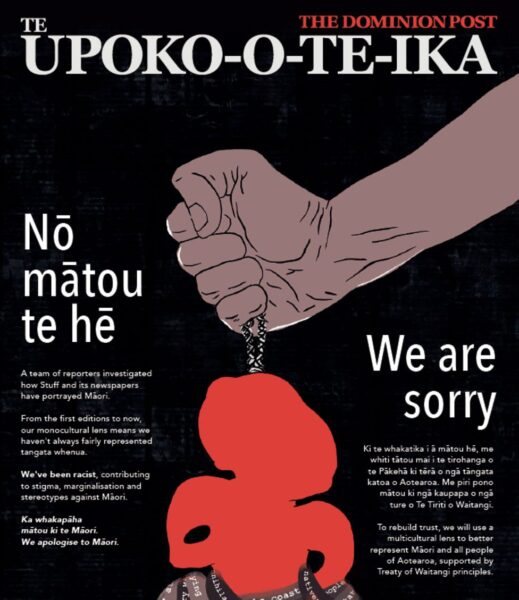
U.N. Votes for Spotlight on Afro-Descendants
The American news media generally don’t pay much attention to the United Nations, so it’s not surprising that a decision last week by the General Assembly to call attention to “the ills of racism, racial discrimination and the legacy of enslavement around the globe” received little coverage.
But the U.N. action comes after a report that noted that “no State has comprehensively accounted for the past or for the current impact of systemic racism” and called for a transformative agenda to tackle violence against Afro-descendants.
The development provides an excellent opportunity for media around the world to examine their own roles in propagating that racism, as some U.S.-based outlets have done in the past few years, many focusing on their roles on the wrong side of the civil rights movement.
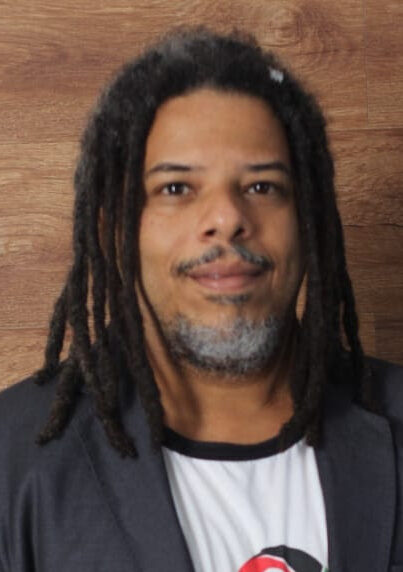 Internationally, for instance, the Knight Center for Journalism in the Americas, through its LatAm Journalism review, spotlighted “four Brazilian Black media outlets that produce anti-racist journalism with a racial perspective” last November. The review explained that, “Despite comprising more than 55 percent of the Brazilian population, Black people are still a minority in the country’s major newsrooms, mainly in leadership positions.”
Internationally, for instance, the Knight Center for Journalism in the Americas, through its LatAm Journalism review, spotlighted “four Brazilian Black media outlets that produce anti-racist journalism with a racial perspective” last November. The review explained that, “Despite comprising more than 55 percent of the Brazilian population, Black people are still a minority in the country’s major newsrooms, mainly in leadership positions.”
The story quoted André Santana (pictured), founder and editor of Correio Nagô, which, “Santana said, was an attempt to counter the traditional press, which reproduced many stigmas about the Black population. ‘We saw little Black presence in journalism and when we saw it it was a very negative approach. There is still this, especially in stories about security, violence. It is always an approach of criminalization, linked to misery. The outlets [of Black media] work to show the diversity that exists in Black communities. Yes, there are many problems, but it also has a lot of potential, a lot of good things,’ he said. . . .”
Last month, Prince Harry and Meghan Markle, the Duke and Duchess of Sussex, issued a statement “seeking to bring awareness to a coalition of U.K. journalists calling for stronger initiatives to combat the underrepresentation, inequity and racial bigotry that still persist in this important industry.”
 Meanwhile, in Ukraine, Karolina Ashion (pictured), a Black Ukrainian television presenter and producer, shared last month “what she describes as the most painful moment of her career: when her former boss — then the director of Ukraine’s 1+1 media conglomerate and current Minister of Culture Alexander Tkachenko — allegedly told her that her appearance on a popular morning show would hurt the network’s ratings.”
Meanwhile, in Ukraine, Karolina Ashion (pictured), a Black Ukrainian television presenter and producer, shared last month “what she describes as the most painful moment of her career: when her former boss — then the director of Ukraine’s 1+1 media conglomerate and current Minister of Culture Alexander Tkachenko — allegedly told her that her appearance on a popular morning show would hurt the network’s ratings.”
The U.N. General Assembly did not specifically mention the media. But it “unanimously adopted a resolution establishing the United Nations Permanent Forum of People of African Descent, a 10-member advisory body that will work closely with the Geneva-based Human Rights Council,” the U.N. reported.
“The new Forum will serve as a consultation mechanism for people of African descent and other stakeholders, and contribute to the elaboration of a UN declaration – a ‘first step towards a legally binding instrument’ on the promotion and full respect of the rights of people of African descent.
“Further, it will work to identify and analyze best practices, challenges, opportunities and initiatives to address issues relevant to people of African descent as highlighted in the Durban Declaration [PDF] and Programme of Action, which was adopted 20 years ago at a landmark UN summit against racism and discrimination.”
The report continued, “Negotiations on the modalities of the Permanent Forum have been under way since November 2014, when the General Assembly officially launched the International Decade for People of African Descent (2015-2024).
“Through the resolution adopted on Monday – which articulates the new body’s mandate for the first time – the Assembly expressed alarm at the spread of racist extremist movements around the globe, and deplored the ‘ongoing and resurgent scourges’ of racism, racial discrimination, xenophobia and related intolerance. . . . “
It’s not difficult to imagine that the media, especially if state-controlled, can play a role in oppressing unpopular groups, Black or otherwise.

Uganda provided a vivid example in 2014, when the tabloid Red Pepper published a list of the ‘top 200 homosexuals” under the headline “Exposed,” a day after the country’s autocratic president, Yoweri Museveni, signed an anti-gay bill.
This column wrote in December about a noteworthy apology in New Zealand. One of the country’s biggest media organizations, Stuff, wrote, “No matou te he; We are sorry,” to its Maori population.
The mea culpa “came after a months-long deep dive into their own reporting which found their coverage of Maori issues had ‘ranged from racist to blinkered’ over the company’s 160-year history,” Flora Drury reported for the BBC.
“The investigation does not make for pretty reading. Scouring its papers, journalists found early, openly racist front pages and recent letters full of bile. It found a tendency to over-report on Maori child abuse cases, while playing down similar crimes in the European, or Pakeha, community. It found countless occasions where it simply hadn’t bothered to ask the Maori community for their side of the story, siding instinctively with the more powerful white population.”
Racism is not strictly an American phenomenon, and in many countries, media are part of the power structure. Who knows what would result from worldwide introspection?
Were the media in South Africa and Rhodesia part of the apartheid system?
What about the genocide in Rwanda or the Nigerian civil war? Which sides do the media take when ethnic and racial conflicts flare in Asia, Europe and Latin America? And what preconceived notions led them to those positions?
In a 2018 story about Ilia Calderón becoming the first Afro-Latina to anchor the evening news for a major broadcast network in the U.S., Univision, Lori Montenegro, national correspondent for Noticiero Telemundo, commented to NBC News about Spanish-language television. “The situation is not limited to the television industry. In general, it is harder for people of color to make headway, break barriers, and stigmas in almost every field. It is something that as a society we continue to struggle with. It is a conversation that still makes a lot of people uncomfortable.”
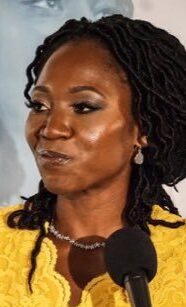 Amara C. Enyia (pictured) is the managing director of Diaspora Rising, “a transnational advocacy organization working on issues of concern to the Global Black Diaspora around the world.” She wrote “A Global Commitment to Combatting Anti-Blackness: Why The World Needs a Permanent Forum on People of African Descent” on July 29 for Ms. magazine.
Amara C. Enyia (pictured) is the managing director of Diaspora Rising, “a transnational advocacy organization working on issues of concern to the Global Black Diaspora around the world.” She wrote “A Global Commitment to Combatting Anti-Blackness: Why The World Needs a Permanent Forum on People of African Descent” on July 29 for Ms. magazine.
Enyia messaged Journal-isms on Monday, “I think one of the biggest issues with media as it relates to the Continent and the Diaspora, is the lack of context in reporting. Media outlets have been complicit in fomenting much of the ignorance or mischaracterization of issues of relevance to the Continent/Diaspora, presenting flat narratives, leaning on tropes about Africa, or allowing government institutions (e.g. ministers and electeds) or institutions like the World Bank or IMF to drive narratives.
“This could be because of structural issues — such as the number of journalists (Black/African), the number of Editors, etc. I’ve also seen a trend of launching ‘Black’ sections for news (e.g. NBC Blk or ABC Soul). These things, while helpful, may only be a sign of news agencies offloading their content into one box where they don’t have to actually work to change the structure in the main newsrooms.”
Asked whether this phenomenon was worldwide, Enyia replied, “I think it’s a worldwide issue, but I should qualify my statement to say major mainstream outlets. I’ve found that independent media outlets have really proliferated in the last several years — some that do more focused, in-depth work, others that are focused on unpacking narratives, blogs, etc.
“In the U.S, it’s definitely a problem because of the outsize role the US has in influencing global media. But this does not let off the hook similar issues taking place in places where press freedom is restricted (e.g. Zimbabwe, Uganda, Eswatini, etc.).”
- Journal-isms: Race, Colorism on Latino Journalists’ Agenda (July 18)
- Júlio Lubianco, LatAm Journalism Review: Collaboration, training and information: Network brings together Black journalists in search of greater representation in communications (in Brazil)
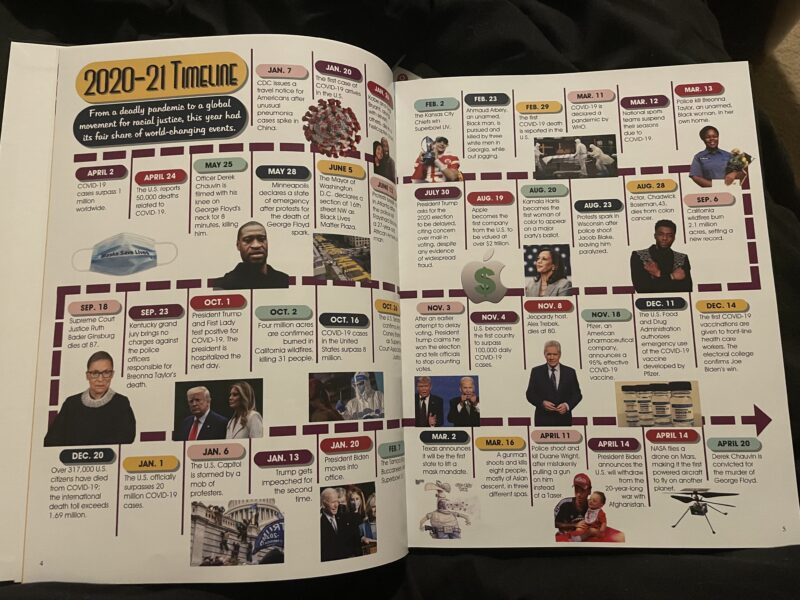
School Rips Out Yearbook Pages on ’20 News Events
The Student Press Law Center said Friday it “condemns the overt censorship by school officials at Bigelow High School in Arkansas, who removed a two-page spread in the yearbook after it was published.
“The spread outlined important events in the world that took place over the academic year, 2020-2021 including the 2020 election, the deaths of public figures like Supreme Court Justice Ruth Bader Ginsburg and Alex Trebek, the impact of COVID-19, the 2021 Super Bowl, the death of George Floyd and more. After school officials said that they had received ‘community backlash’ about the spread, they ripped out the pages from the yearbooks before they could be fully distributed. . . .
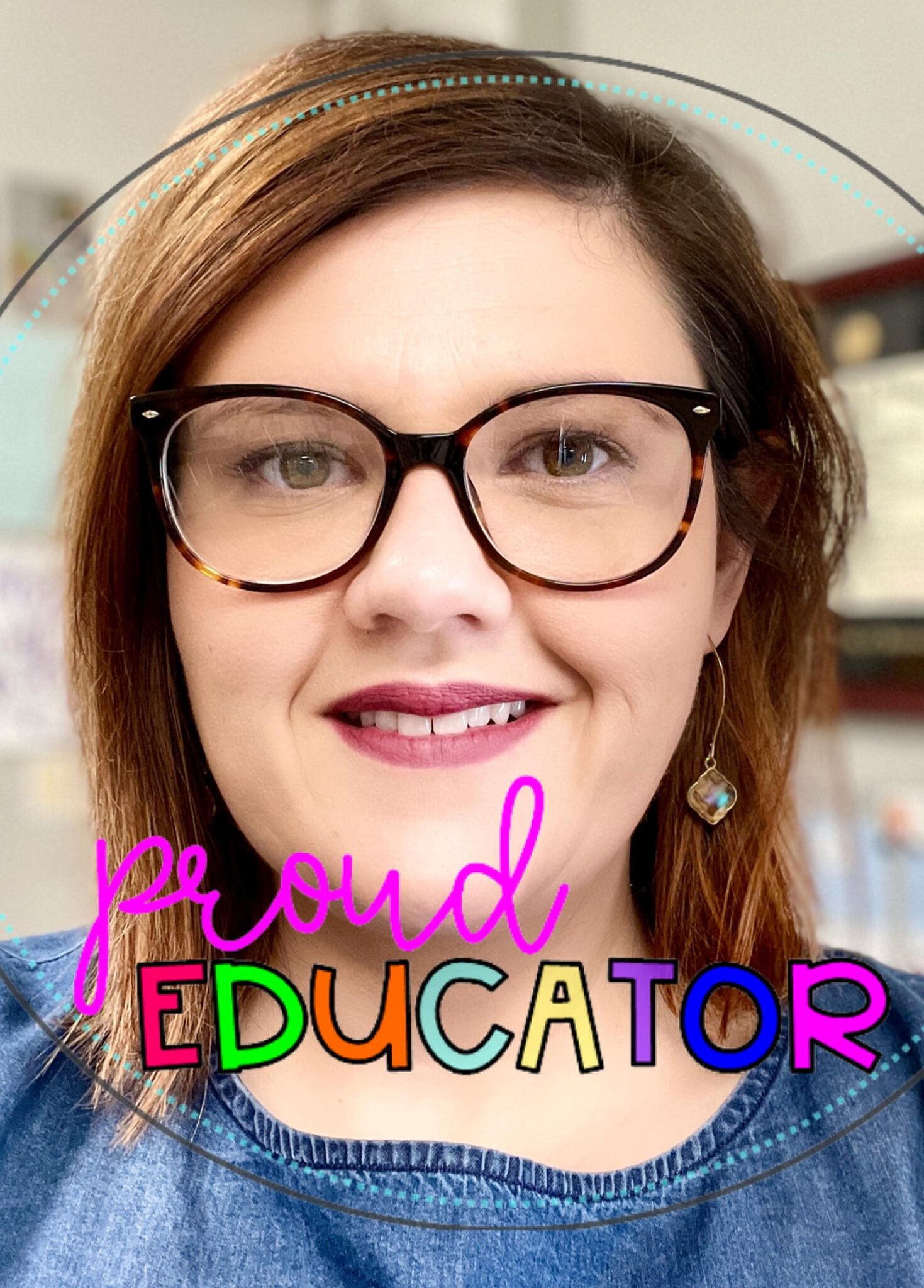 “The yearbook adviser, Meghan Walton (pictured), resigned because of the censorship, saying ‘I did not authorize the removal of these pages, nor do I support it in any way. Deciding to resign was the most difficult decision I have ever made. However, I needed to stand up for myself and for the students who created that yearbook spread.’
“The yearbook adviser, Meghan Walton (pictured), resigned because of the censorship, saying ‘I did not authorize the removal of these pages, nor do I support it in any way. Deciding to resign was the most difficult decision I have ever made. However, I needed to stand up for myself and for the students who created that yearbook spread.’
[Walton explained in a message to Journal-isms Tuesday: “I tried to just resign as adviser to student publications (yearbook and newspaper) and stay employed as an English teacher. I even volunteered to continue teaching a beginning journalism class without a publication since my background is in print journalism. They declined, saying that the yearbook was the best one to come out of Bigelow (other than those two pages), and I had to choose between continuing on as adviser or resign from the district.
[“I chose to resign since I strongly feel as if my journalistic integrity has been questioned, and it would unfairly put a target on the backs of myself and my students.”]
“SPLC Executive Director Hadar Harris said, ‘The controversy at Bigelow High School is only the latest in a number of egregious censorship cases that we have seen in yearbooks across the country this year to wipe certain aspects of the past school year out of our collective memory. We are very concerned that this is just the tip of the iceberg for both yearbooks (which are currently being released) and for student newspapers beginning to report on the new school year.’
“In June, yearbook sales were paused by school officials at West Broward High School in central Florida due to coverage of the Black Lives Matter movement in the yearbook. . . .”
More than 40 percent of students enrolled in the district are Black, according to the Broward County Public Schools website. At Bigelow, the student body “is something like 3 percent minority,” Walton told Journal-isms.

Black Reporter Was Right in Rejecting WWII Spin
“ ‘Loeb Reflects On Atomic Bombed Area,’ read the headline in The Atlanta Daily World of Oct. 5, 1945, two months after Hiroshima’s ruin,” William J. Broad reported Monday for The New York Times.
“In the world of Black newspapers, that name alone was enough to attract readers.
“Charles H. Loeb was a Black war correspondent whose articles in World War II were distributed to papers across the United States by the National Negro Publishers Association. In the article, Mr. Loeb told how bursts of deadly radiation had sickened and killed the city’s residents. His perspective, while coolly analytic, cast light on a major wartime cover up.
“The Page 1 article contradicted the War Department, the Manhattan Project, and The New York Times and its star reporter, William L. Laurence, on what had become a bitter dispute between the victor and the vanquished. Japan insisted that the bomb’s invisible rays at Hiroshima and Nagasaki had led to waves of sudden death and lingering illness. Emphatically, the United States denied that charge.
“But science and history would prove Mr. Loeb right. His reporting not only challenged the official government line but also echoed the skepticism of many Black Americans, who, scholars say, worried that race had played a role in the United States’ decision to drop the experimental weapons on Japan. Black clergy and activists at times sympathized openly with the bomb’s victims. . . .”
Broad also wrote, “search of databases suggests that few if any journalists of Mr. Loeb’s day approached his level of detail and tight focus in telling of the radiation poisoning.
“The Times sought to ignore the topic altogether. Beverly Deepe Keever, a professor of journalism, analyzed its coverage of the Hiroshima bombing and reported that out of 132 articles she examined, she could find only one that mentioned radiation. . . .”
Pulitzer Prize nomination, anyone? Jon Funabiki, longtime diversity advocate who recently retired as journalism professor at San Francisco State University, messaged Journal-isms, “I’ll gladly sign the petition.”
- William J. Broad, New York Times: How a Star Times Reporter Got Paid by Government Agencies He Covered
Cleveland Residents Train to Cover Meetings
Some 250 Cleveland-area residents have been trained as Documenters, “a nonprofit program that pays community members to take notes (and often live tweet) at public meetings of the school board, city and county councils, and other municipal bodies,” Amber C. Walker wrote Wednesday for The Grade.
“The notes are then posted on the Documenters website, where they are publicly viewable and searchable.
“As legacy newspapers across the country face corporate consolidation and staffing cuts, local K-12 education coverage suffers. Niche publications like Chalkbeat and The 74 have emerged to fill in the gaps, writing stories traditionally covered by education beat reporters at newspapers.
“There are also programs like The Documenters that take a different approach. While traditional reporting outlets tend to focus only on the bigger stories, The Documenters’ notes give a more complete picture of what is happening at the school board meetings. . . .”
Blacks, Latinos Not Set on One Term for Identity
“Most Black Americans, 58%, do not have a preference between the terms ‘Black’ and ‘African American’ when asked which term they would rather people use to describe their racial group,” Justin McCarthy and Whitney Dupree reported for the Gallup organization. “The one in three who express a preference divide evenly between preferring each term.”
They also wrote, “Hispanic respondents were asked a similar question about their preference among the terms ‘Hispanic,’ ‘Latino’ and ‘Latinx’ — with this final option being a newer, gender-neutral term favored by some Hispanic Americans.
“Most Hispanic adults (57%) say it does not matter to them which term is used, though nearly one in four (23%) prefer ‘Hispanic’ and 15% prefer ‘Latino.’ Few expressed a preference for ‘Latinx’ (4%).”
McCarthy and Dupree continued, “In the current survey, for the first time, Gallup asked a follow-up question of Black respondents who did not have a preference whether they lean toward one term over the other if they had to choose.
“Black Americans were fairly mixed on the question, with a slight preference for ‘Black’ (52%) over ‘African American’ (44%). Four percent had no opinion either way. . . .”
Satisfaction With Asian Americans’ Treatment Dips
. . . Separately, Gallup found that 46 percent of Americans — an all-time low — reported being satisfied with the treatment of Asian Americans. It’s a sharp decline from last year’s 60 percent, Bianca Brutus reported for NBC News.
“The poll was conducted this summer and follows a surge in anti-Asian attacks this year.
The survey “additionally revealed a decline in the perception of relations of Asian Americans with other racial groups. Between white Americans and Asian Americans, 67 percent said relations were good or very good, and between Black Americans and Asian Americans, 58 percent agreed relations were favorable.
“Additionally, 30 percent of Black Americans were satisfied by the treatment of Asian Americans in comparison to white Americans at 50 percent and Hispanic Americans at 44 percent.”
Brutus also wrote, “Since the surge of Asian hate crimes, Black Americans have often been inaccurately portrayed as the main perpetrators. According to a report by the Southern Poverty Law Center published in February, the majority of all U.S. hate crimes are committed by white people, but Black Americans have been disproportionately listed as the perpetrators by state law enforcement and the FBI.”
Passings
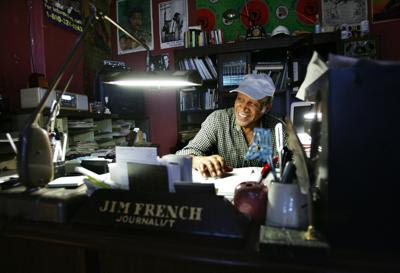
James French, Founded Charleston Paper
“James French, who played a central role in the Lowcountry’s African American community as founder and editor of The Charleston Chronicle, died on July 31,” Adam Parker wrote Aug. 2 for the Post and Courier in Charleston, S.C. “He was 94.
“For decades, French’s Chronicle was both a gathering point for Black leaders and a means to distribute information about issues impacting African Americans in the Charleston area. It celebrated local accomplishments and tackled big concerns such as gentrification, racial injustice and economic problems.
“French started the weekly paper in the summer of 1971, two years after he retired from the Navy. In 2016, French handed the reins to his grandchildren Tolbert and Damion Smalls. . . .”
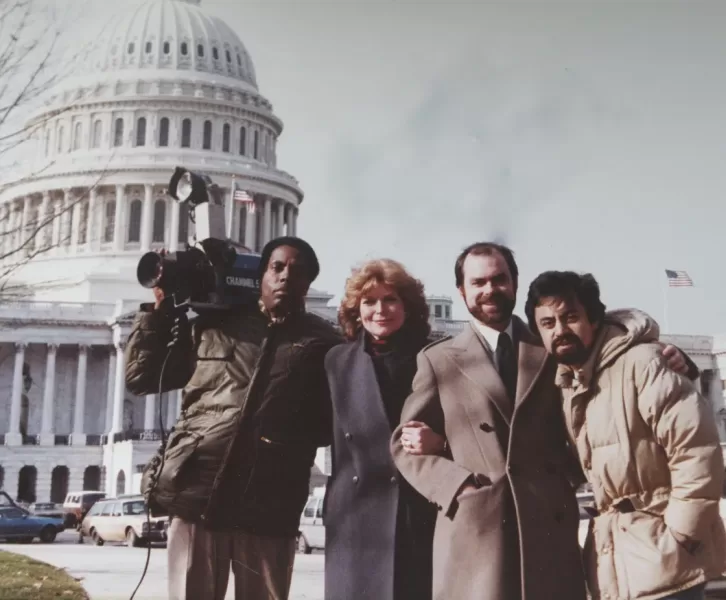
Jim Stricklin, Chicago Photographer, of COVID
“When Billy Jennings was a young news photographer at WMAQ-TV, it hit him. He’d landed a big job in a big market with big on-air talent. He started to pace the newsroom floor,” Maureen O’Donnell reported Aug. 3 for the Chicago Sun-Times.
“Jennings remembers telling Jim Stricklin, a cameraman who’d covered everything from Chicago street gangs to prison riots, he was nervous.
“’Let me tell you something,’ he said Mr. Stricklin told him. ‘There are times you’re going to go out without a reporter — but they are never going to go out without you. You’re the tip of the spear. If you didn’t shoot it, it didn’t happen. Tell that story with your pictures, and you’ll be fine.’
“After that, Jennings, who’s now WMAQ’s chief photographer, said, ‘I just kind of settled down.’
“Mr. Stricklin, who was one of WMAQ’s first Black news photographers and had a 40-year career, died July 26 at Kindred Chicago Lakeshore Hospital of COVID-19, according to Marita Joyce Stricklin, his wife of 57 years. The Hyde Park resident, who was 88, became ill despite having been vaccinated against the coronavirus, she said. . . .”
O’Donnell also reported, “Mr. Stricklin was a steward for the National Association of Broadcast Employees and Technicians, according to retired WMAQ anchor Art Norman. . . .
“If a fledgling reporter didn’t know the right questions, ‘He leaned over and told you what to ask,’ WMAQ-TV political reporter Mary Ann Ahern said. . . .”
Rough Road for Afghans Who Helped U.S. Media
“In July, a coalition of news organizations and press groups — including the New York Times, the Washington Post and the Committee to Protect Journalists — wrote to the Biden administration and Congressional leaders with an urgent request. They sought humanitarian relief and a special visa program for journalists and support staff who contributed to US media coverage of the war in Afghanistan,” Jon Allsop wrote Friday for Columbia Journalism Review.
On Aug. 2, two weeks after the request was sent, the State Department acted on the request, announcing a refugee program for Afghans who have worked for US news organizations, NGOs, or other projects, and plugging holes in an existing plan for Afghans who have worked for the US military.
“It was a welcome development; still, details were scarce, and the requirements we know about seem onerous. Media referrals to the program must come from a news outlet’s most senior leader. (That person must be a US citizen.) And even though the US has arranged transport out of Afghanistan for many of those who served the military, people eligible for the news-related program will have to make their own way to a third country, apply to the US government from there, and wait months for a decision.
“The State Department has pledged to support Afghanistan’s neighbors in dealing with refugee flows, and said that its process will further ‘evolve’ — but for many Afghans, just getting to the border is dangerous and expensive. ‘This is incredibly hard,’ Antony Blinken, the secretary of state, acknowledged. . . .”
- Kimbery Dozier, Time: The Afghan Who Saved My Life May Make It Out. What About Everyone Else? (Aug. 3)
- Emma Graham-Harrison, the Guardian: UK media unite to urge visas for Afghan reporters at risk from Taliban
- Megan K. Stack, The New Yorker: A Near Press Blackout in Afghanistan: The war that Americans forgot is ending in chaos and secrecy.
- Joe Warmington, Toronto Sun: More planes landing, but stranded Afghan interpreters not on board: Government bureaucracy keeping targeted interpreters off life-saving Canadian airlift
- Lauren Wolfe, Washington Monthly: The Afghan Friends We Leave Behind

Drive Starts to Honor Historic Black Paper
While researching the life of Thomas Washington, a Black man in Essex County, Va., who was lynched in 1896, Reggie Carter came across his story in multiple Virginia newspapers, but one outlet stood out to him, Tamica Jean-Charles reported Wednesday, updated Friday, in the Progress-Index of Petersburg, Va.
The Richmond Planet, a Black-owned newspaper, covered Essex County’s only documented lynching.
Jean-Charles wrote, “Sometimes referenced as a newspaper ‘born in the wake of freedom,’ The Richmond Planet was cultivated by 13 freed slaves. The Richmond Planet fiercely campaigned for racial equality and was unafraid to call out the city’s injustices.”
She continued, “Carter is now embarking on his latest project, The Richmond Planet Plate. The license plate honors a former Black newspaper in Richmond and its fight for racial equality.
“In order to have the license plate offered in the DMV, Carter must acquire 450 pre-registrations and have it passed in the General Assembly with the backing of a politician. . . .
“Carter has until Dec. 31 to collect the needed orders in time to present his plate to the assembly floor. He’s already secured the backing of Sen. Joseph Morrisey (D-16) and Del. Jeff Bourne (D-71) and Mitchell’s descendant, John Mitchell Jr. and the Richmond Planet Foundation. . . .”
2 Public Stations Disclose Diversity Figures
Two public radio stations last week disclosed their staff diversity figures.
At Minnesota Public Radio, Managing Editor Sarah J. Glover, immediate past president of the National Association of Black Journalists, listed these figures:
“On July 26, 2021, MPR News had a staff of 67 full-time and regular part-time employees.
“Of those 67 people, 15 identify as people of color and 52 identify as white.
“Of those 67 people, 34 identify as female and 33 identify as male.”
In Boston, WGBH, which markets itself as simply “GBH,” reported Aug. 3, “GBH’s workforce is 80% white, according to data released by the organization in July. The 863 employees span departments such as TV, radio, digital news, event planning, human resources and more. Racial diversity is lower among the executive team, which is 89% white, higher among content producers and higher among advisory and fiduciary boards.
“Jon Abbott, the president and CEO of GBH, discussed the data with Arun Rath on GBH’s All Things Considered Tuesday.
“ ‘To be 20% diverse wasn’t terrifically surprising to me,’ he said. ‘It was disappointing, and obviously we are going to be working on that part of our representation of diverse staff, with regards to race, over the next few years. And I think, I know, in the last year we’ve made a range of investments in our recruiting, in our outreach and training and our work across our staff.’ “
Short Takes
- The Association for Education in Journalism and Mass Communication (AEJMC) concluded its four-day virtual conference Saturday with 2,157 attendees and approximately 284 sessions. Among the honorees were CNN’s Omar Jimenez, who was arrested live on air in Minneapolis last year, given the First Amendment Award, and Earnest L. Perry of the Missouri School of Journalism, who received the Lionel C. Barrow, Jr., Award for Distinguished Achievement in Diversity Research. The AEJMC Minorities and Communication division was among those tweeting throughout.
- “The American Civil Liberties Union (ACLU) is calling on the Justice Department (DOJ) to enact permanent protections for journalists and legal observers at protests, including preventing federal agents from arresting or using physical force against these individuals,” Celine Castronuovo reported Friday for The Hill. The ACLU was joined by the National Association of Black Journalists and the NewsGuild-CWA labor union.
- Gannett Co. is joining other news organizations in a new approach to crime coverage, editors say, that will focus on offering context, identifying trends and following stories to their end, Angela Fu reported Monday for the Poynter Institute.
- “Following critical stories about the policing of anti-pipeline activists, a Minnesota law enforcement agency barred a federally affiliated body from releasing documents through the state’s public records laws, according to documents obtained by The Intercept,” Will Parrish reported Saturday for The Intercept. He also wrote, “The unusual policy came after The Intercept and other media outlets published stories documenting law enforcement surveillance and coordination with private security during protests against Line 3, part of a trend in which aggressive policing against pipeline opponents across the U.S. was reported by media. . . .”
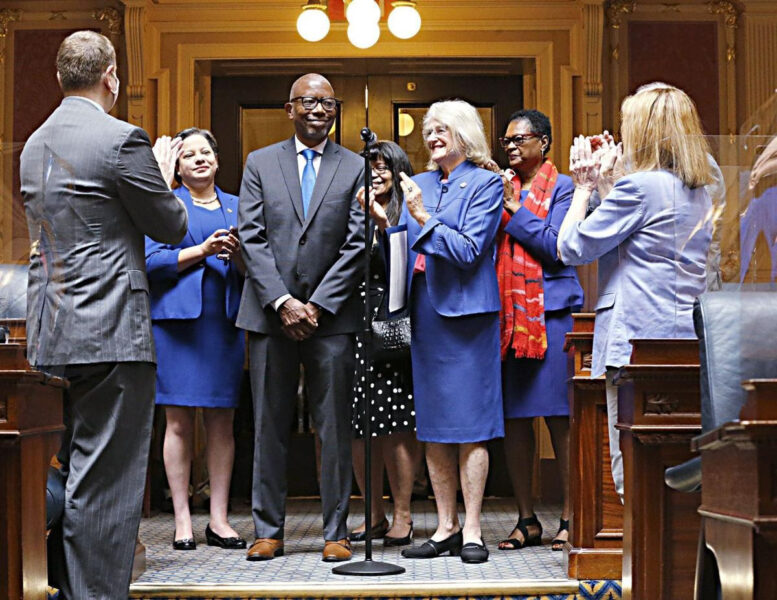
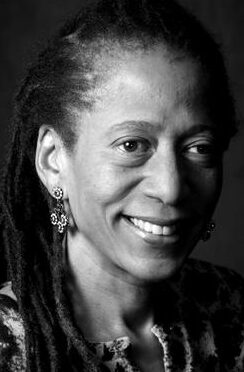 “Dozens of former staff and civic leaders are preparing to launch Friends of The Chicago Reporter, with the goal of restoring the Reporter’s groundbreaking investigative reporting on race and class in the Chicago region, journalist Laura Washington (pictured) a spokesperson for the group, messaged Journal-isms on Monday. “We have learned that the Community Renewal Society,” the Reporter’s owner, “is forming an ‘Advisory Table’ that will inform plans to move the Reporter forward. It is a shame that it took nearly a year to begin this process. Nevertheless, we are encouraged by the news that CRS is engaged in strategic planning on the Reporter’s future. We hope this process will soon get the Reporter back on track. We also hope that CRS will include our representatives in that process, as we helped build the Reporter’s legacy and mission over 50 years.” Washington had written in The Nation in January under the headline, “What’s Happening to ‘The Chicago Reporter’?”
“Dozens of former staff and civic leaders are preparing to launch Friends of The Chicago Reporter, with the goal of restoring the Reporter’s groundbreaking investigative reporting on race and class in the Chicago region, journalist Laura Washington (pictured) a spokesperson for the group, messaged Journal-isms on Monday. “We have learned that the Community Renewal Society,” the Reporter’s owner, “is forming an ‘Advisory Table’ that will inform plans to move the Reporter forward. It is a shame that it took nearly a year to begin this process. Nevertheless, we are encouraged by the news that CRS is engaged in strategic planning on the Reporter’s future. We hope this process will soon get the Reporter back on track. We also hope that CRS will include our representatives in that process, as we helped build the Reporter’s legacy and mission over 50 years.” Washington had written in The Nation in January under the headline, “What’s Happening to ‘The Chicago Reporter’?”
- Urban One CEO Alfred Liggins is planning a casino in Richmond, Va., Radio Ink reported Thursday. Liggins “said the next step is to get the issue on the ballot this fall and the courts have until August 13th to do that. The Richmond City Council has already voted to approve the casino.”
- “The problem started more than a century ago, when the federal government began funding land-grant colleges, originally segregated by race,” Stephen Elliott reported July 6 for Nashville Scene. “For Tennessee, that meant money for continued operations at the all-white University of Tennessee and for the establishment of what is now called Tennessee State University, which allowed Black students to attend. In the years since, the two schools have been funded unequally, and not just because UT has more students. After years of pressure, mostly from Black state lawmakers, the Tennessee legislature is seeking to make amends.” Instead of a lump sum, GOP Sen. Richard Briggs “imagines state spending on maintenance and capital projects, scholarships and other needs at TSU over the course of several years. . . .”
 “TVNewser has learned that CBS News’ human resources boss Jose Andino (pictured) is heading to ABC News as vice president – office of the president & process management,” A.J. Katz reported Friday for TVNewser. “ABC News president Kim Godwin joined the network in May, and is poaching Andino from her old employer. . . . Andino is considered a force for change, according to a source familiar with the matter. He’s being brought in to help clean up the culture and serve as a key lieutenant to Godwin. . . .”
“TVNewser has learned that CBS News’ human resources boss Jose Andino (pictured) is heading to ABC News as vice president – office of the president & process management,” A.J. Katz reported Friday for TVNewser. “ABC News president Kim Godwin joined the network in May, and is poaching Andino from her old employer. . . . Andino is considered a force for change, according to a source familiar with the matter. He’s being brought in to help clean up the culture and serve as a key lieutenant to Godwin. . . .”
 The Hollywood Foreign Press Association, which bestows the Golden Globe awards, “‘has approved the new set of bylaws that had been proposed to reform the organization, recruit more diverse and inclusive members and address the ethics and accountability issues that have long swirled around the organization,” Michael Schneider reported Thursday for Variety. Schneider also wrote, “The group has also been working on new membership goals in light of the reveal, first reported last spring by the Los Angeles Times, that the HFPA had no Black members. . . . The group has already released a framework for reform that includes measures to increase the number of people of color in its ranks.” Meanwhile, Rebecca Sun wrote Tuesday for the Hollywood Reporter under the headline, “How Will the HFPA Find Black Members? ‘We’ve Always Been Out There’.”
The Hollywood Foreign Press Association, which bestows the Golden Globe awards, “‘has approved the new set of bylaws that had been proposed to reform the organization, recruit more diverse and inclusive members and address the ethics and accountability issues that have long swirled around the organization,” Michael Schneider reported Thursday for Variety. Schneider also wrote, “The group has also been working on new membership goals in light of the reveal, first reported last spring by the Los Angeles Times, that the HFPA had no Black members. . . . The group has already released a framework for reform that includes measures to increase the number of people of color in its ranks.” Meanwhile, Rebecca Sun wrote Tuesday for the Hollywood Reporter under the headline, “How Will the HFPA Find Black Members? ‘We’ve Always Been Out There’.”
- “Bloomberg Media and Ebony are teaming up to make Black stories more visible,” Mark Stenberg wrote Thursday for Adweek. “The two publishers announced a year-long content-sharing collaboration this morning to cross-pollinate the Bloomberg Equality and Ebony audiences through original content, brand exposure initiatives and custom reports. . . .”
- “A coalition of news media outlets has asked the judge who oversaw the trial of Derek Chauvin to release the identities of jurors who convicted him in the death of George Floyd, saying there is no known threat to juror safety that would warrant keeping their names sealed,” Amy Forliti reported Wednesday for the Associated Press.
 “Award-winning news executive Eric Ludgood (pictured) has been hired as the head of Newsy by The E.W. Scripps Company . . . effective Aug. 16, the company announced Thursday. The announcement explained, “Newsy provides straightforward, opinion-free news across multiple platforms. While already available on nearly every major over-the-top and connected TV platform, Newsy will launch over the air in more than 90% of U.S. television homes – and in all major markets – on Oct. 1, carried primarily over Scripps-owned broadcast stations’ spectrum. . . .”
“Award-winning news executive Eric Ludgood (pictured) has been hired as the head of Newsy by The E.W. Scripps Company . . . effective Aug. 16, the company announced Thursday. The announcement explained, “Newsy provides straightforward, opinion-free news across multiple platforms. While already available on nearly every major over-the-top and connected TV platform, Newsy will launch over the air in more than 90% of U.S. television homes – and in all major markets – on Oct. 1, carried primarily over Scripps-owned broadcast stations’ spectrum. . . .”
- Kevin Merida, who became executive editor of the Los Angeles Times in June, has said he wants the L.A. Times to be more than a newspaper, to reach consumers in a variety of ways. On July 22, Shani Hilton was appointed to the newly created role of managing editor for new initiatives. Last week, the Times sent a survey to subscribers asking how they consume breaking news and information about live events. “We have more than 400,000 digital subscribers (including via partners, like Apple News+) and about 250,000 direct paid digital subscribers…which means we have as many as 250K subscriber emails, to send the survey,” Times spokesperson Hillary Manning messaged Journal-isms.
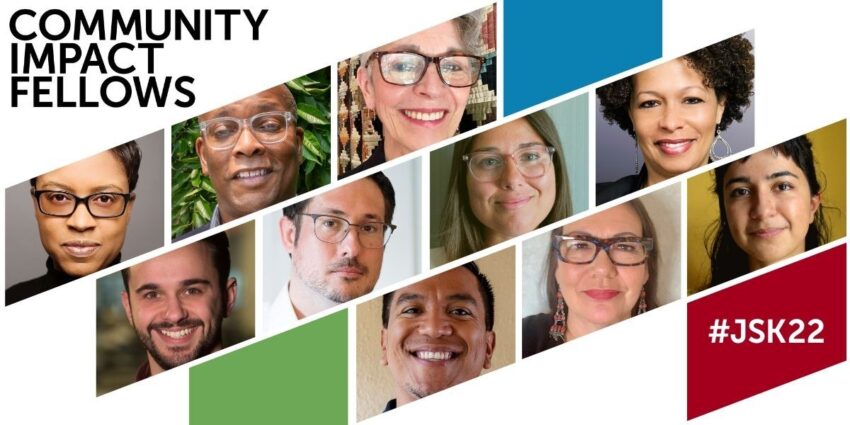
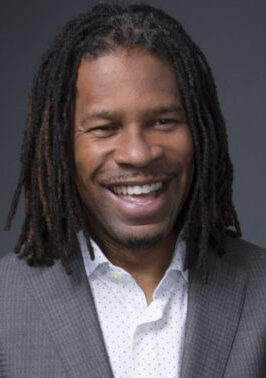 “Another long-standing ESPN figure is leaving,” Andrew Bucholtz reported Aug. 3 for Awful Announcing. “That would be LZ Granderson (pictured), who posted to Instagram earlier this week that this will be his last week with ESPN. Granderson already has several other roles, including as a sports and culture columnist with the Los Angeles Times (a role he started in 2019), as a contributor to ABC News, and as the host of the Life out Loud ABC Audio podcast, but he’s been an important ESPN figure on a lot of fronts. . . .”
“Another long-standing ESPN figure is leaving,” Andrew Bucholtz reported Aug. 3 for Awful Announcing. “That would be LZ Granderson (pictured), who posted to Instagram earlier this week that this will be his last week with ESPN. Granderson already has several other roles, including as a sports and culture columnist with the Los Angeles Times (a role he started in 2019), as a contributor to ABC News, and as the host of the Life out Loud ABC Audio podcast, but he’s been an important ESPN figure on a lot of fronts. . . .”
 “Days after announcing her brain cancer diagnosis, Channel 2′s Jovita Moore (pictured) wanted to share an update with all of you,” WSB-TV in Atlanta wrote on Wednesday. “This week, Jovita received some good news from her doctor about her most recent brain scans. “The tumor they were unable to remove during surgery in April is responding to treatment. The doctor said the chemotherapy and radiation have caused the tumor to reduce in size. . . .”
“Days after announcing her brain cancer diagnosis, Channel 2′s Jovita Moore (pictured) wanted to share an update with all of you,” WSB-TV in Atlanta wrote on Wednesday. “This week, Jovita received some good news from her doctor about her most recent brain scans. “The tumor they were unable to remove during surgery in April is responding to treatment. The doctor said the chemotherapy and radiation have caused the tumor to reduce in size. . . .”
 “Filmmaker Robert Rodriguez (pictured) has taken El Rey Network — once a linear cable TV channel — and revived the Latino-focused brand for the streaming era in partnership with Cinedigm,” Todd Spangler reported Friday for Variety. “Launched in 2013, El Rey Network at its peak reached over 40 million pay-TV households. The cable channel, stocked with a range of English-language scripted and unscripted programming catering to Latino audiences and beyond, shut down at the end of 2020. . . .”
“Filmmaker Robert Rodriguez (pictured) has taken El Rey Network — once a linear cable TV channel — and revived the Latino-focused brand for the streaming era in partnership with Cinedigm,” Todd Spangler reported Friday for Variety. “Launched in 2013, El Rey Network at its peak reached over 40 million pay-TV households. The cable channel, stocked with a range of English-language scripted and unscripted programming catering to Latino audiences and beyond, shut down at the end of 2020. . . .”
- “Public schools in Rhode Island are now required to teach a comprehensive African American history and heritage curriculum under legislation signed into law Friday by Gov. Daniel McKee,” the Associated Press reported July 30. Meanwhile, the Los Angeles Times Sunday weighed in with an editorial under the headline “What critical race theory is — and isn’t — and why it belongs in schools.“
 Jared McCallister (pictured), who wrote the “Caribbeat” column for 38 years for the Daily News in New York, took a buyout shortly after the cost-cutting Alden Global Capital bought the News along with other Tribune Co. properties in May. But McCallister messaged Monday, “The deal is I will continue to write the column twice a month, instead of weekly. Right now, indefinitely. Not sure about anything else, but I just edited a Harlem Week supplement, also post buyout. But special supplements like that, and Black History Month, I’ve been doing for at least the past decade or more. Moving forward, I don’t know.” McCallister has been at the News for 44 years.
Jared McCallister (pictured), who wrote the “Caribbeat” column for 38 years for the Daily News in New York, took a buyout shortly after the cost-cutting Alden Global Capital bought the News along with other Tribune Co. properties in May. But McCallister messaged Monday, “The deal is I will continue to write the column twice a month, instead of weekly. Right now, indefinitely. Not sure about anything else, but I just edited a Harlem Week supplement, also post buyout. But special supplements like that, and Black History Month, I’ve been doing for at least the past decade or more. Moving forward, I don’t know.” McCallister has been at the News for 44 years.
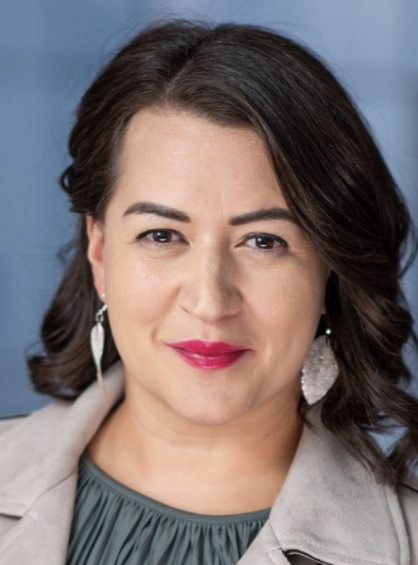 Lauren Lopez (pictured), head of talent and engagement at the National Basketball Association, is joining The New York Times as senior vice president of talent management, the Times announced Aug. 2. “In this newly created role, she will ensure that we set clear expectations and standardize our approach to performance, career development, organization design and D.E.I. [diversity, equity and inclusion], and communicate those expectations to employees,” wrote Jacqueline Welch, executive vice president and chief human resources officer.
Lauren Lopez (pictured), head of talent and engagement at the National Basketball Association, is joining The New York Times as senior vice president of talent management, the Times announced Aug. 2. “In this newly created role, she will ensure that we set clear expectations and standardize our approach to performance, career development, organization design and D.E.I. [diversity, equity and inclusion], and communicate those expectations to employees,” wrote Jacqueline Welch, executive vice president and chief human resources officer.
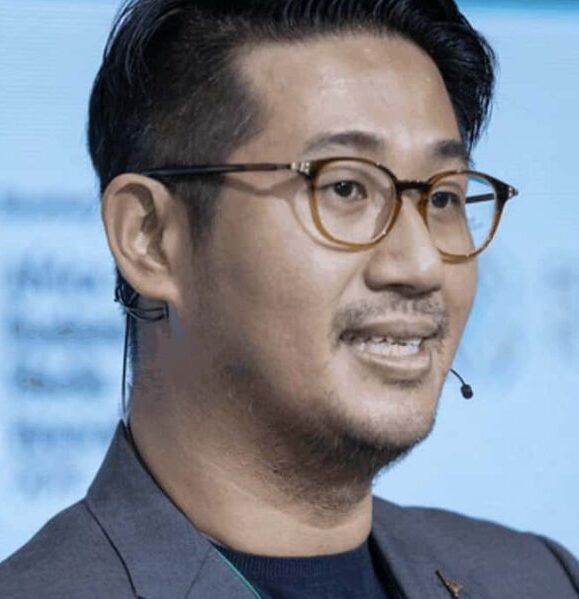 Under the Center for Public Integrity’s previous CEO, Susan Smith Richardson (now at The Guardian), CPI recentered its journalism on a single topic (though one that touches a thousand others): inequality, Joshua Benton wrote Monday for Nieman Lab. “You can see the change in how the center describes itself. Before: ‘The Center for Public Integrity is a nonprofit, nonpartisan newsroom investigating democracy, power and privilege.’ Now: ‘The Center for Public Integrity inspires change using investigative reporting that reveals the causes and effects of inequality.‘ The new CEO, Paul Cheung (pictured), told Benton, “when we think about the revised mission, it’s a broader mission to reach a new type of audience, right? And when we think about who are the people who care about taking down inequity — like when we think about the movement that we’ve seen in [TikTok], right, post-BLM and #StopAsianHate — we’ve seen that there’s more ground movement. And we hope to reach that adience who could use our content and create that movement for themselves. . . .”
Under the Center for Public Integrity’s previous CEO, Susan Smith Richardson (now at The Guardian), CPI recentered its journalism on a single topic (though one that touches a thousand others): inequality, Joshua Benton wrote Monday for Nieman Lab. “You can see the change in how the center describes itself. Before: ‘The Center for Public Integrity is a nonprofit, nonpartisan newsroom investigating democracy, power and privilege.’ Now: ‘The Center for Public Integrity inspires change using investigative reporting that reveals the causes and effects of inequality.‘ The new CEO, Paul Cheung (pictured), told Benton, “when we think about the revised mission, it’s a broader mission to reach a new type of audience, right? And when we think about who are the people who care about taking down inequity — like when we think about the movement that we’ve seen in [TikTok], right, post-BLM and #StopAsianHate — we’ve seen that there’s more ground movement. And we hope to reach that adience who could use our content and create that movement for themselves. . . .”
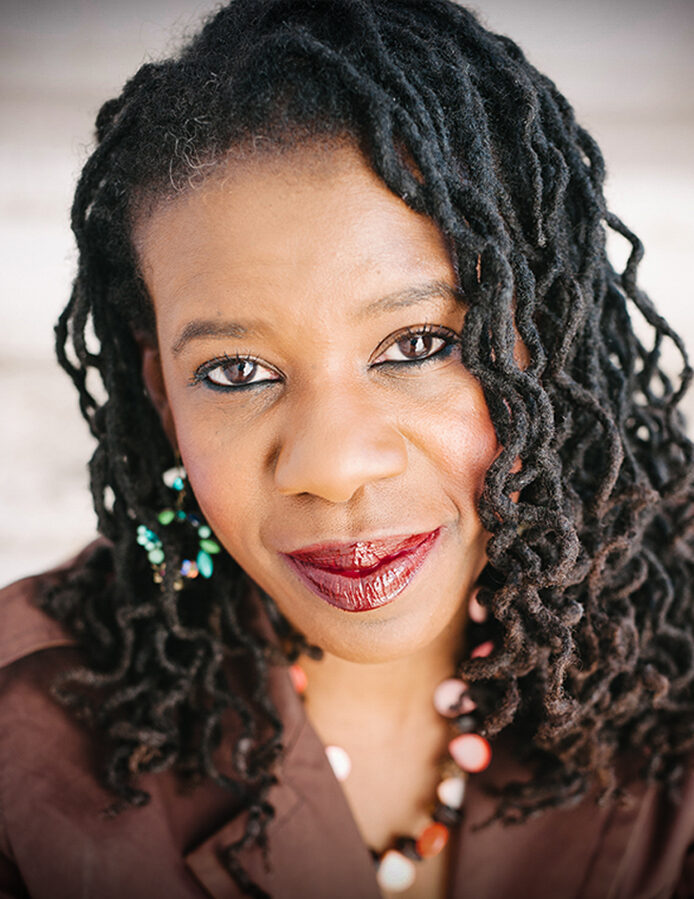 “Veteran journalist Lottie Joiner (pictured) has been named the new editor-in-chief of Capital & Main, a leading nonprofit investigative news publication that reports on inequality and climate change,” Captial & Main reported Aug. 2. “Joiner, who starts today, comes to Capital & Main from the NAACP’s The Crisis magazine, where she served as editor-in-chief. . . .”
“Veteran journalist Lottie Joiner (pictured) has been named the new editor-in-chief of Capital & Main, a leading nonprofit investigative news publication that reports on inequality and climate change,” Captial & Main reported Aug. 2. “Joiner, who starts today, comes to Capital & Main from the NAACP’s The Crisis magazine, where she served as editor-in-chief. . . .”
- “The city of Jackson will be required to pay more than $170,000 in legal fees to WLBT’s parent company, Gray Television, after the Mississippi Ethics Commission ruled the city violated state law by taking more than a year to provide public records to WLBT,” the station reported Friday. “The fine represents the largest amount of money levied against a public body by the commission in Mississippi history, and will be one of a handful of times that the commission has required a public body to pay legal fees.” WLBT is part of broadcast history, as its license was revoked by the Federal Communications Commission in 1971 over the station’s segregationist practices, and given to a non-profit, bi-racial group.
- Eighteen months after its kickoff party, the 19th can reasonably be called a success. It has raised $13 million, attracted 10,500 paying members, and hired more than 30 staffers,” Margaret Sullivan wrote Wednesday for The Washington Post. “Although it does not share audience numbers, it has landed scoopy interviews, including the first with Kamala D. Harris after Joe Biden named her as his running mate. Politico called the 19th ‘the start-up scoring all the Biden admin. interviews,’ noting that it has also interviewed prominent Republican women. . . .”
- “Masked men claiming to represent Mexico’s most powerful drug cartel have taken the unusual step of circulating a video threatening to kill a national television news anchor for what they viewed as unfair coverage,” the Associated Press reported Tuesday. “The video circulated Monday showed masked and heavily armed men surrounding a man seated at a small desk who delivered a message he said was from Ruben Oseguera Cervantes, aka ‘El Mencho,’ leader of the Jalisco New Generation cartel. It was unclear if the person reading the message was Oseguera himself. The message complained that Milenio Television, a national cable news channel associated with a major newspaper chain, was favoring so-called self-defense groups that are battling the Jalisco cartel in Michoacan state. He singled out Mileno anchor Azucena Uresti, threatening to kill her and make her eat her words. . . .”
“After boarding a bus in Venezuela’s capital, Juan Pablo Lares sits in front facing the passengers, turns on a microphone and speaker, and delivers the news while a colleague holds a black cardboard frame around his face to mimic a television screen,” Regina Garcia Cano and Juan Pablo Arraez reported Thursday for the Associated Press. They also wrote, “That rudimentary news delivery system is one of several ways journalists are fighting to preserve press freedom in the South American nation. . . .” (Credit: BBC/YouTube)
- “Twenty one media outlets from nine countries in Latin America will benefit from US $2 million as part of the Google News Initiative (GNI) Innovation Challenge to improve operations, strengthen business models, create new products and more,” Teresa Mioli reported July 22 for LatAm Journalism Review. Mioli also wrote, “The media selected for the second edition of the Innovation Challenge are from Argentina (5), Bolivia (1), Brazil (8), Colombia (1), Costa Rica (1), El Salvador (1), Guatemala (1), Mexico (1) and Peru (2). They were chosen from more than 300 proposals, according to Google.”
To subscribe at no cost, please send an email to journal-isms+subscribe@groups.io and say who you are.
Facebook users: “Like” “Richard Prince’s Journal-isms” on Facebook.
Follow Richard Prince on Twitter @princeeditor
Richard Prince’s Journal-isms originates from Washington. It began in print before most of us knew what the internet was, and it would like to be referred to as a “column.” Any views expressed in the column are those of the person or organization quoted and not those of any other entity. Send tips, comments and concerns to Richard Prince at journal-isms+owner@
View previous columns (after Feb. 13, 2016).
View previous columns (before Feb. 13, 2016)
- Diversity’s Greatest Hits, 2018 (Jan. 4, 2019)
- Book Notes: Is Taking a Knee Really All That? (Dec. 20, 2018)
- Book Notes: Challenging ’45’ and Proudly Telling the Story (Dec. 18, 2018)
- Book Notes: Get Down With the Legends! (Dec. 11, 2018)
- Journalist Richard Prince w/Joe Madison (Sirius XM, April 18, 2018) (podcast)
- Richard Prince (journalist) (Wikipedia entry)
- February 2018 Podcast: Richard “Dick” Prince on the need for newsroom diversity (Gabriel Greschler, Student Press Law Center, Feb. 26, 2018)
- Diversity’s Greatest Hits, 2017 — Where Will They Take Us in the Year Ahead?
- Book Notes: Best Sellers, Uncovered Treasures, Overlooked History (Dec. 19, 2017)
- An advocate for diversity in the media is still pressing for representation, (Courtland Milloy, Washington Post, Nov. 28, 2017)
- Morgan Global Journalism Review: Journal-isms Journeys On (Aug. 31, 2017)
- Diversity’s Greatest Hits, 2016
- Book Notes: 16 Writers Dish About ‘Chelle,’ the First Lady
- Book Notes: From Coretta to Barack, and in Search of the Godfather
- Journal-isms’ Richard Prince Wants Your Ideas (FishbowlDC, Feb. 26, 2016)
- “JOURNAL-ISMS” IS LATEST TO BEAR BRUNT OF INDUSTRY’S ECONOMIC WOES (Feb. 19, 2016)
- Richard Prince with Charlayne Hunter-Gault,“PBS NewsHour,” “What stagnant diversity means for America’s newsrooms” (Dec. 15, 2015)
- Book Notes: Journalists Follow Their Passions
- Book Notes: Journalists Who Rocked Their World
- Book Notes: Hands Up! Read This!
- Book Notes: New Cosby Bio Looks Like a Best-Seller
- Journo-diversity advocate turns attention to Ezra Klein project (Erik Wemple, Washington Post, March 5, 2014)
When you shop @AmazonSmile, Amazon will make a donation to Journal-Isms Inc. https://t.co/OFkE3Gu0eK
— Richard Prince (@princeeditor) March 16, 2018

